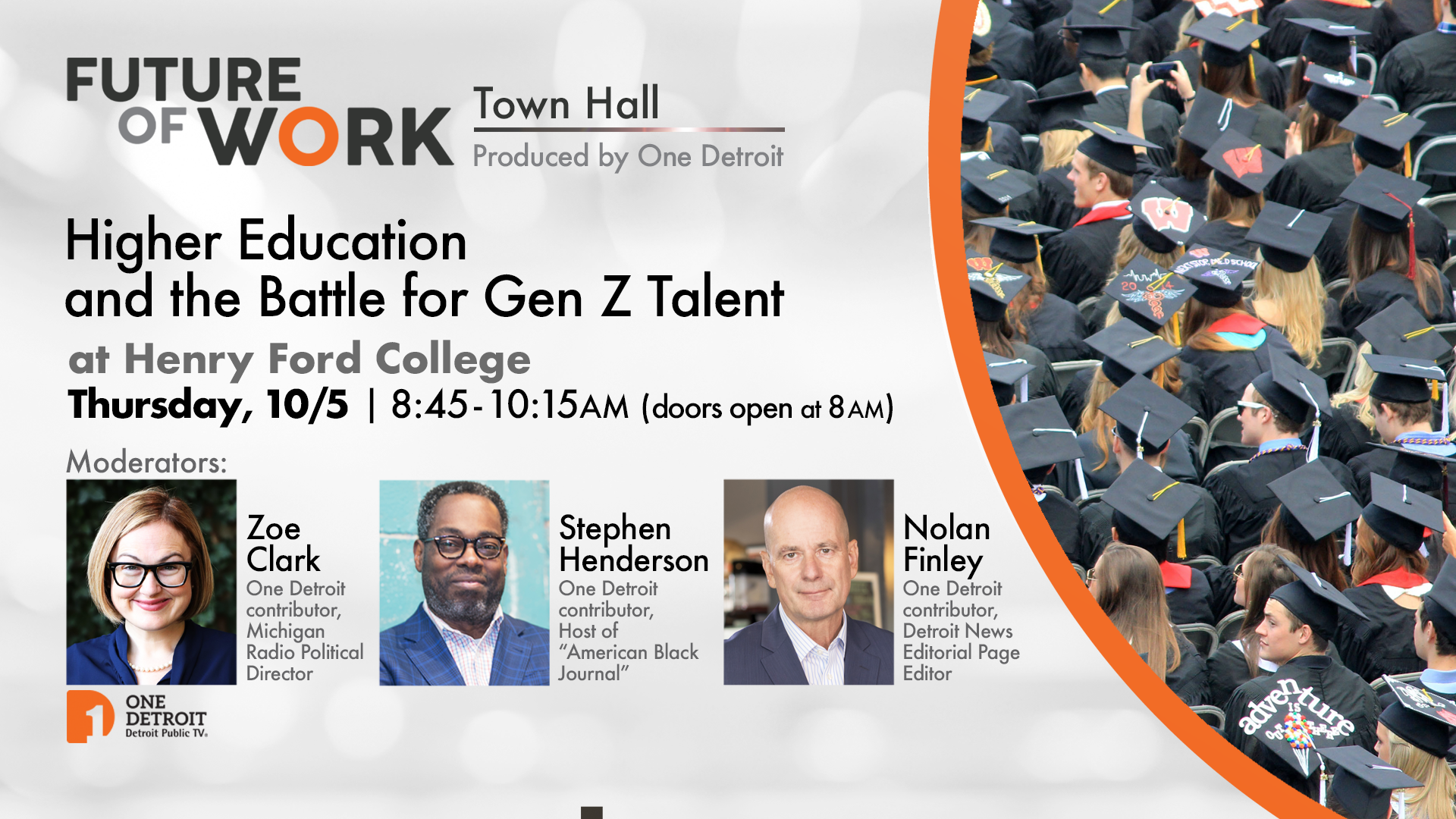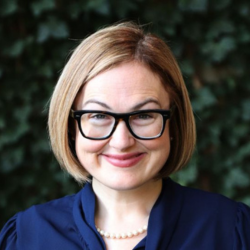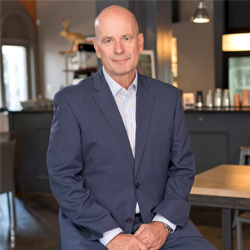
- This event has passed.
Higher Education and the Battle for Gen Z Talent | Future of Work Town Hall
October 5, 2023 @ 8:00 am - 10:30 am

The future of work is top of mind in Michigan as policymakers, business leaders, non-profits, and academia grapple with one of our state’s chief concerns: attracting and retaining Gen Z talent.
On Thursday, Oct. 5 at 8:45 a.m., Detroit Public Television’s “One Detroit” will host a live, in-person Future of Work townhall at the Roseneau Board Room inside the Andrew A. Mazzara Administrative Services and Conference Center on the campus of Henry Ford College,
Many of the state’s top critical thinkers will tackle crucial issues such as: How does Michigan stack up against states like California, Texas and New York? What must it do to become a destination for aspiring workers? And how will it provide the talent to drive the burgeoning and expanding sectors of mobility, energy and healthcare?
The event will include a one-on-one conversation between Michigan’s newly appointed Chief Growth Officer, Hilary Doe and Michigan Radio’s Zoe Clark as they discuss Doe’s challenge and her plans for attracting a younger generation of talent, not just to join the workforce but to become advocates for Michigan.
The Detroit News’ Nolan Finley will be joined by new Wayne State President Kimberly Andrews Espy and Henry Ford College President Russ Kavalhuna. They will explore how higher education in Michigan should respond to the growing talent gap and what conversations are needed to take place between community colleges and four-year universities.
There will also be a focused discussion on equity with Fatima Salman, President of the National Association of Social Workers-MI and Kimberly Faison, Detroit Future City’s Director of Community and Economic Development, Onjila Odeneal, Senior Director of Policy and Advocacy (Michigan), TICAS-The Institute for College Access & Success.
Moderated by “American Black Journal” host Stephen Henderson, this panel will address how Michigan can improve outcomes for young students of color and what Michigan’s institutions of higher education must do to diversify their admissions and ensure first-generation students have the support they need.
Doors open at 8 a.m. and the town hall will begin at 8:45 a.m. Coffee and bagels will be provided. We hope to see you there!
RELATED STORIES:
This town hall will be moderated by:
Zoe Clark, One Detroit contributor, Political Director for Michigan Radio

Zoe Clark is Michigan Radio’s Political Director. In this role, Clark guides coverage of the state Capitol, elections, and policy debates. She offers regular on-air political analysis and hosts the November election-focused edition of Stateside on Fridays. Clark also regularly offers political analysis on NPR, PBS, and CNN.
Nolan Finley, One Detroit contributor, Editorial Page Editor at the Detroit News

Nolan Finley is the editorial page editor of The Detroit News, a position he’s held since May 1, 2000. He directs the expression of the newspaper’s editorial position on various national and local issues and also writes a column in the Thursday and Sunday newspapers. Nolan also contributes to Detroit Public Television’s “One Detroit.”
Stephen Henderson, One Detroit contributor, host of “American Black Journal”

Stephen Henderson is the current host of American Black Journal, WDET’s Detroit Today and former Pulitzer Prize-winning editorial page editor of The Detroit Free Press. A Detroit native, Henderson is a graduate of University of Detroit Jesuit High School and the University of Michigan.
Meet the panelists:
Hilary Doe, Michigan Chief Growth Officer
As Chief Growth Officer, Hilary leads the state’s efforts to grow Michigan’s population, economy, and reputation as the best place to live, work, raise a family, and start a business. Hilary works alongside the Growing Michigan Together Council on a once-in-a-generation effort to grow Michigan’s population, boost economic growth, and make Michigan the place everyone wants to call home.
Hilary is a dynamic leader in nonprofits, technology, strategy, and public policy. She served as the national director at the Roosevelt Network, where she built and led an organization engaging thousands of young people in civic engagement and social change programming at chapters nationwide, which ultimately earned the organization recognition as a recipient of the MacArthur Award for Creative and Effective Institutions.
She also served as Vice President of the Roosevelt Institute, where she oversaw strategy and expanded the Institute’s Four Freedoms Center, with the goal of empowering communities and reducing inequality alongside the greatest economists of our generations. Most recently, she served as President and Chief Strategy Officer at Nationbuilder, working to equip the world’s leaders with software to grow their movements, businesses, and organizations, while spreading democracy.
Hilary is a graduate of the University of Michigan’s Honors College and Ford School of Public Policy, a Detroit resident, and proud Michigander.
Kimberly Andrews Espy, Wayne State University President
Kimberly Andrews Espy, Ph.D., is the 13th president of Wayne State University.
A leader with more than 25 years of experience in higher education, President Espy previously served as provost and senior vice president for academic affairs at the University of Texas at San Antonio (UTSA), where she championed social and economic opportunity by promoting affordable access to a top-quality research university education.
During her tenure, UTSA earned the distinction of an R1 classification by the Carnegie Foundation and was invited to join the Alliance of Hispanic Serving Research Universities after earning the Seal of Excelencia from Excelencia in Education for its commitment to serving Hispanic students — and, by extension, all students. UTSA also was named a 2022 Degree Completion Finalist by the Association of Public and Land-Grant Universities. Her work played an important role in making UTSA one of only five research universities nationwide to receive a $40 million gift from Mackenzie Scott in 2021 to advance student success to those underserved by higher education.
As UTSA’s provost, President Espy strived to advance social mobility through improved student learning, which she strengthened through a strong focus on the recruitment and retention of outstanding diverse faculty who are leaders in their disciplines. Working collaboratively across every corner of campus, she furthered an outstanding academic environment, including the establishment of the University of Texas School of Public Health San Antonio (in partnership with UT Health San Antonio); the merger with Southwest School of Art; and the reorganization of the College for Health, Community and Policy and the Klesse College of Engineering and Integrated Design.
Under her tenure, UTSA strengthened its commitment to preparing students for success beyond graduation in collaboration with the city’s business and community leaders. In 2020, the university established the Najim Center for Innovation and Career Advancement, which enabled systematic career preparation activities for students across the institution. President Espy also played a key role in UTSA’s contributions to San Antonio’s economic development. The San Pedro 1 Building, the home for UTSA’s School for Data Science, opened in 2022 and was a major university investment in the city’s downtown. For her commitment to the community and her work as an agent of change, she was recognized with a Women’s Leadership Award from the San Antonio Business Journal.
Prior to serving as UTSA’s provost, President Espy was senior vice president for research at the University of Arizona, where research and development awards increased to record levels. Focusing on strategic external partnerships, she was a member of the leadership team that established the historic academic partnership with Banner Health, and also worked with industry and government partners to stand up the Defense Security Research Institute that supported mission-focused applications. She also served as vice president for research and innovation and dean of the graduate school at the University of Oregon, where she helped secure funding from the Oregon state legislature to advance economic development and value to the state.
At the University of Nebraska-Lincoln, President Espy developed collaborative interdisciplinary teams for large-scale proposals, including the ADVANCE initiative that increased the number of female and other diverse STEM faculty. She started her academic career at Southern Illinois University School of Medicine, a rural, community-oriented medical school where she taught first-year medical student neuroscience using the then-pioneering problem-based learning curriculum, which has been widely adopted across the United States.
President Espy is an elected fellow of the American Association for the Advancement of Science. Her work has been continuously funded by the National Institutes of Health since 2002, and she has earned more than $22 million in funding to study how young children control their attention to promote later learning, academic and health outcomes, and how such skills can be affected by medical, environmental or social factors. As both an American Psychological Association Division 40 Early Career Award winner and Elected Fellow, President Espy has chaired NIH study sections, served other review panels and actively contributed to the scientific literature in her field.
President Espy has served on numerous national and state leadership boards and committees, including the Association of Public and Land-Grant Universities, the Government-University-Industry Research Roundtable, the Council on Competitiveness, the Association of Universities for Research in Astronomy, Association for the Accreditation of Human Research Protection Programs, the Institute for Research on Innovation and Science, Arizona Technology Council, Governor’s (OR) Regional Solutions Committee, and Shawnee Health Services.
President Espy received her undergraduate degree in psychology from Rice University and her M.A. and Ph.D. in clinical neuropsychology from the University of Houston. She also completed a clinical/pediatric psychology internship at the University of Louisville School of Medicine/Bingham Child Guidance Center and a postdoctoral fellowship at the University of Arizona College of Medicine. She is a licensed clinical psychologist and a native of Cincinnati.
President Espy was the Wayne State Board of Governors’ unanimous choice for president. She is the first woman to serve in this role in the institution’s history.
Russ Kavalhuna, Henry Ford Community College President
Russell A. Kavalhuna, J.D., joined Henry Ford College as the institution’s sixth president in July 2018. The role unites his passions for public service, education, and institutional leadership. As the son of an immigrant who attended a Michigan community college, he believes the community college model of education and service is the gateway to the American Dream.
Before becoming president at Henry Ford College, Mr. Kavalhuna was the Executive Director of Flight Operations at the Western Michigan University College of Aviation, the nation’s third-largest collegiate aviation program. He also taught a course in the curriculum. Prior to his position at WMU, Mr. Kavalhuna was a federal prosecutor and a commercial airline captain.
Mr. Kavalhuna served as a federal prosecutor for the U.S. Department of Justice in Grand Rapids, Michigan, where he managed more than 140 officers in a multi-year investigation and prosecution of 31 gang members. He was a senior lawyer for the Michigan Supreme Court, and he has taught at Western Michigan University Cooley Law School.
As a pilot, he served as first officer and captain for U.S. Airways Express for five years. He also held a leadership position in the Airline Pilots Association collective bargaining unit.
Mr. Kavalhuna earned his undergraduate degree in aviation science from Western Michigan University. He earned his juris doctor from WMU Cooley Law School. He finished third in his class and was selected by his classmates as the Valedictorian speaker.
His awards and honors include the Airline Transport Pilot Certificate, the highest civilian license; the ATF National Honor Award for Prosecution of Organized Crime; the Outstanding Achievement Award from the Holland Police Department; and being named as an “Up and Coming Lawyer” by Michigan Lawyers Weekly.
President Kavalhuna, his wife, Courtney, and their children are proud residents of Dearborn.
Fatima Salman, President, National Association of Social Workers-MI
Fatima Salman is part of the ENGAGE team at the University of Michigan School of Social Work which coordinates the School of Social Work to connect with communities and organizations to increase their ability and resources to meet their goals. Through the work of ENGAGE, she is the Project Manager for the Employment Equity Action and Learning Collaborative, a collaborative of 65+ stakeholders working in Detroit that come together to leverage resources and foster just and equitable economic development for individuals in the city of Detroit.
Fatima completed her undergraduate from the University of Michigan in 2000 and taught language and linguistics at a private school. During a three-year period in which she lived in Madison, Wisconsin, she was the principal of a local elementary school. Her focus and passion is youth leadership development and mental health aid for youth. She came back to Michigan and completed her MSW from the UNiversity of Michigan. She worked as the Executive Director for the Muslim Students Association during the organization’s time of transition and merged her expertise in youth development with her macro management skills.
She currently serves on the Program Committee for The Children’s Center in Detroit, Michigan, is a Racial Equity Fellow with Detroit Equity Action Lab, and is a committee member of the Protect Michigan COVID Commission. Additionally, Fatima was elected by her peers nationally to serve as Chair of the NASW Council of Chapter Presidents through 2024.
Kimberly Faison, Director of Community and Economic Development
Kimberly Faison is the Director of Community and Economic Development at Detroit Future City (DFC). In this role, Kimberly leads adaptive reuse strategies for commercial and industrial properties and equitable economic development. This includes serving as a convener, facilitator, and project manager for the Detroit Neighborhood Housing Compact, with the goal of strengthening the single-family housing delivery system by bringing together public, private, nonprofit, and philanthropic stakeholders to take collective action and regularly collaborate around strategies for building a healthier housing market.
Kimberly has two decades of experience in economic and community development. She previously served as a program officer for the Ralph C. Wilson, Jr. Foundation, supporting the foundation’s work in nonprofit support and innovation, entrepreneurship and economic development. Kimberly also served as the director of entrepreneurial initiatives at Southwest Solutions, which included leading a citywide collaboration supporting emerging entrepreneurs called ProsperUs Detroit. In this role, she managed staff and program operations while actively engaging in program fundraising, grants management, and extensive data analysis.
Kimberly is dedicated to the improvement of both systems-level and place-level infrastructures that impact low-income communities and communities of color. She serves as secretary of the City of Inkster Planning Commission, is a board member of ProsperUS Detroit, and is a member of several trade associations. Kimberly has a bachelor’s degree in urban and regional planning from Eastern Michigan University.
Onjila Odeneal, Senior Director of Policy and Advocacy (Michigan), The Institute for College Access & Success
Native Michigander, from Detroit, Onjila Odeneal leads state policy efforts on higher education access, affordability, and success in Michigan. She is committed to student and community-centered efforts that improve access navigation, simplifying processes, and financial resource allocation to ensure that postsecondary credential attainment is a reality for all students equitably.
Prior to joining TICAS, Onjila worked in college access and success strategy development and professional development by way of collective impact at Detroit College Access Network as the Deputy Director and acting Executive Director. She also has 8 years of experience in financial aid as a financial aid administrator and assistant director in both public and private institutions in Michigan and out of state.
Onjila is a product of the Michigan public K-12 and higher education systems, holding bachelor’s degrees in business administration and political science from the University of Detroit Mercy and an M.Ed. in Educational Psychology from Wayne State University.
Thank you to our sponsors:
This event is also made possible by the support of our Future of Work partners:



